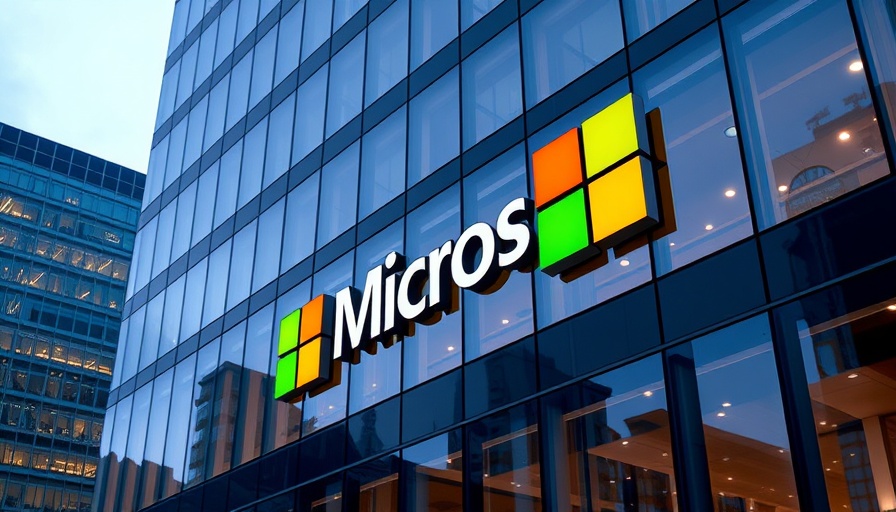
Microsoft's Bold Move in AI Reasoning Models
In the competitive world of artificial intelligence (AI), Microsoft is steering its ship towards developing in-house reasoning models that aim to rival the prowess of OpenAI. Recently, reports surfaced indicating that the tech giant is testing AI systems from various entities, including xAI, DeepSeek, and Meta, all in a bid to reshape its Copilot product away from its heavy reliance on OpenAI's technology.
The Drive for Self-Sufficiency in AI
With over $13 billion invested in OpenAI, Microsoft has traditionally benefited from the startup's innovations. However, as Microsoft endeavors to establish its own identity in AI, the urgency to develop proprietary reasoning models is palpable. These models, referred to internally as MAI, have reportedly shown comparable performance to leading models such as those from OpenAI and Anthropic, particularly on benchmark tasks.
The reasoning models stand out because they aim to replicate human cognitive processes through logical reasoning and problem-solving steps, breaking down complex tasks into manageable parts. This new approach falls under the emerging trend of specialized language models that are increasingly seen as crucial for future AI applications.
Moving Beyond Just Language Models
Unlike standard large language models, which generate responses based solely on the input they receive, reasoning models are designed to articulate their thought processes. This is achieved through what is known as chain-of-thought reasoning, improving the reliability and clarity of AI outputs. Microsoft’s ambition to integrate these capabilities into Copilot illustrates a significant shift towards enhancing the AI's decision-making and reasoning capabilities.
The Challenge of Collaboration vs. Competition
Previously viewed as partners, Microsoft's developing autonomy hints at a looming competition as their business paths appear to diverge. Microsoft's partnership with OpenAI, which began as a mutually beneficial relationship, faces the potential risks of turning into a rivalry. Analysts have noted that while collaboration has seen significant advances, Microsoft's plan to utilize alternative models is not only a matter of diversification but also a strategic maneuver to avoid becoming overly dependent on OpenAI.
However, this transition isn't without challenges. Delays in releasing the MAI models—initially expected to debut last year—have been attributed to a slew of technical setbacks and strategic shifts within Microsoft's AI division. Furthermore, the distinct technological philosophies of Microsoft, which roots its approach in structured processes, and OpenAI, which thrives on spontaneity and innovation, highlight the complexities of their evolving relationship.
Future Predictions for AI Landscape
As Microsoft continues its quest for self-sufficiency in AI, it raises important questions about the future landscape of artificial intelligence. Will the rise of reasoning models lead to a fragmentation of the AI market, where specialized models provide tailored solutions for specific problems? Or will more comprehensive models prevail, providing all-encompassing solutions capable of tackling varied AI challenges?
Experts agree that the outcome depends on how effectively Microsoft balances its priorities moving forward—whether it adapts to new innovations while maintaining its foundational technologies will determine its success in the fast-evolving AI arena.
For AI Lovers: Embrace the Journey Ahead
The forthcoming developments from Microsoft represent a thrilling chapter in the AI narrative. For enthusiasts and professionals alike, it showcases not just technological advancements but also how competitive dynamics can foster innovation. As Microsoft prepares to release its reasoning models later this year, the excitement and anticipation surrounding what this will mean for developers and end-users alike is a conversation to watch.
With competitive products on the horizon, it’s essential for AI enthusiasts to stay informed and engaged with these developments, as they are likely to reshape our interactions with technology. The advancements in reasoning models could signal a shift not just in how we deploy AI but also in how we think about and utilize these powerful tools in our daily lives.
Stay connected to the latest AI innovations, as the journey of technology continues to unfold colorful narratives, evolving from mere concepts to impactful solutions that enhance the way we live and work.
 Add Row
Add Row  Add
Add 




 Add Row
Add Row  Add
Add 

Write A Comment